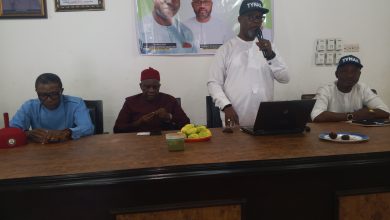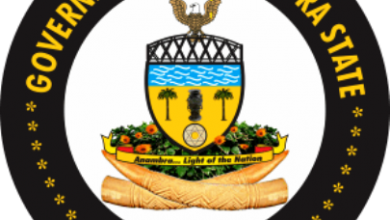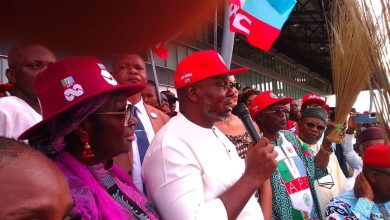Uncategorized
Constitution Review: Why Some Amendments Fail- Sen. Ekweremadu
…Calls for Six-regional structure
…Explains why it is difficult to create new state
The Deputy President of the Senate, Senator Ike Ekweremadu, has blamed embedded ethno-sectional interests and considerations as major stumbling blocks to Nigeria’s quest for a more acceptable constitution.
He stated this while delivering the 2015 Annual Lecture of the Faculty of Law, Nnamdi Azikiwe University, Awka, Anambra State on Monday.
Senator Ekweremadu regretted that vital amendments, which should have helped to deepen Nigeria’s democratic experience, strengthen equity and justice, and escalate national development had perished at the alters of mutual suspicion and narrow elites interests masqueraded as ethno-sectional interests.
“Mutual ethno-sectional and religious suspicions have become so ingrained in our body polity that even the most patriotic and altruistic intentions are almost always interpreted from myopic prisms of such sentiments and interests”, he lamented.
This was even as expressed happiness that although such ethno-sectional tendencies cut across the nation, there was a “growing ranks of detribalised Nigerians who will eventually aggregate to move this nation forward”.
The Senator who piloted the first sets of successful amendments to the 1999 Constitution in the 6th National Assembly, said the last efforts to further alter the constitution were scuttled by vested interests due to misperceptions over the attempt to remove presidential assent to constitution amendment bills, set a 30-day timeline for presidential assent to normal bills or indicate refusal of assent, failing which it automatically becomes an Act of the National Assembly in line with the United States presidential system where the president has a grace period of only two weeks.
He also listed, among others, the attempt to separate the Office of the Minister of Justice from that of the Attorney-General, which current merger in a political appointee, he said, leads to abuses and clogs in the wheel of justice.
He said: “Currently, by simply entering a nolle proseque, the Attorney-General of the Federation can technically quash a case. The same applies at the state level.
“So, Section 150 was altered to provide for establishment of the Office of Minister of Justice separate from Office of the Attorney General of the Federation. New Sections 174A-174H were inserted to set out the qualifications and secure autonomy, improved powers for the Attorney-General of the Federation, and insulate the Office from political manipulations.
“For instance, while the National Judicial Council was to recommend, the president was to appoint, while the National Assembly was to confirm. In the same manner, Section 195 was amended to provide for the Office of Commissioner for Justice separate from Attorney General of each state”.
He however regretted that such patriotic efforts were quashed after the 2015 election as some people thought it would whittle down the powers of the incoming president; hence the former President was misled into retracting his assent.
Continuing, he said: “It was very reliably gathered by the National Assembly that former President Goodluck Jonathan indeed appended his signature to the Alteration Bill presented to him and had, thus assented to the Bill. However, the former Attorney General of the Federation who was against assenting to the Bill subsequently persuaded him to veto it.
“The Presidency wrote to the National Assembly stating clearly that he was returning the Bill, but the Bill did not accompany the letter. This prompted the National Assembly to demand the return of the original Bill sent to the President for assent in the light of his alleged veto, but the Presidency refused this request, ostensibly because there would have been no way of covering up the fact of the signing of the original alteration bill by the President”.
He expressed surprise at the sudden change of heart by the former Attorney-General whom he said never opposed the idea throughout the public hearings.
“The answer rests solely on ethno-sectional politics and interests”, he stated.
The Deputy President of the Senate said the Constitution Review Committees of both Chambers of the National Assembly were made up people from every part of the country and could therefore not have amended the constitution to constrain or unduly favour any part of the federation.
“The truth is that the amendments were completed in October/November 2014 before the 2015 general elections, so, how could we have even known that the former President would lose the 2015 election?” the Deputy President of the Senate, queried.
He regretted a situation where the decision of an entire country could be scuttled by the veto of one man/woman, explaining that a bill to alter any part of the constitution was the only bill requiring the approval of at least two-thirds of both Chambers of the National Assembly and at least 24 states of federation to pass.
Senator Ekweremadu called on the political elites, North and South, to have a rethink so the nation could move forward.
“It is noteworthy that no group or part of the country, whether North or South, can lay claim to innocence in the ethno-sectional intrigues that becloud constitution review efforts in Nigeria; we all have our portions of the blame” he emphasised.
He explained: “Our recommendations were in the best interest of the country. Nigerians know and have often complained that too much power is vested in the presidency. Our aim was to democratise power in the best interest of the country.
“You cannot make an enduring law with an individual or section of the country in mind because it will not stand the test of time. Importantly, a country is built around enduring laws and institutions, not the trust in the goodness of a leader, whether incumbent or incoming”.
Senator Ekweremadu also reiterated his call for the restructuring of the country into six regions, along the six geopolitical zones as the current 36 state-structure was unsustainable due to high cost of governance resulting from unnecessary duplication of political offices and bureaucracy.
He said: “If we have anything to learn from the current oil glut and the hard times that have befallen us, it is that breastfeeding 36 states will ultimately not work. We may pretend for as long as possible, but we cannot pretend forever”.
The Senator, however, said until the nation was ready to embrace the reality, the South East deserved an additional state “for the sake of equity in the distribution of resources and opportunities”.
Senator Ekweremadu was also quick to add that creating extra state required political solution and understanding as the military had “planted stumbling blocks in the Constitution”.
“Creating a state in Nigeria by the provisions of Section 8 of the 1999 Constitution is like passing a camel through the eye of a needle as the military have more or less locked the structure of the country the way they wanted it and threw the key into the Atlantic Ocean”.
The Governors of Enugu State, Rt. Hon. Ifeanyi Ugwuanyi, Deputy Governor of Anambra State, members of the diplomatic corps, among other renowned academics and politicians from across the country, attended the public lecture.





